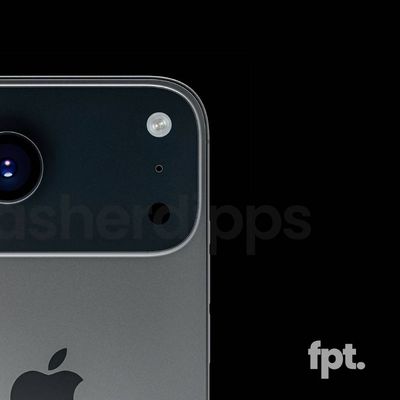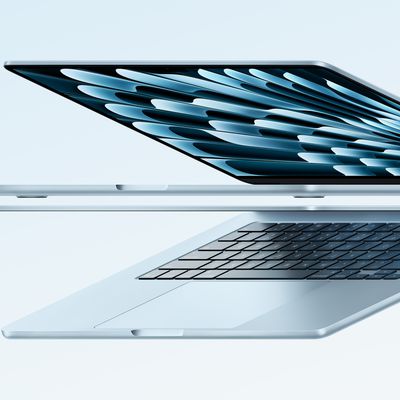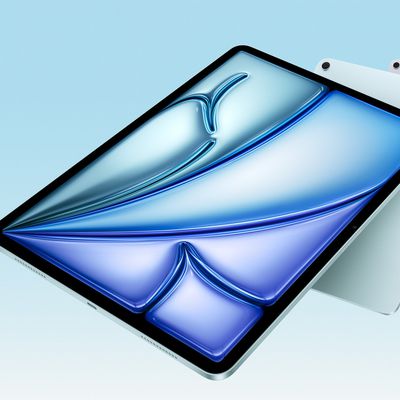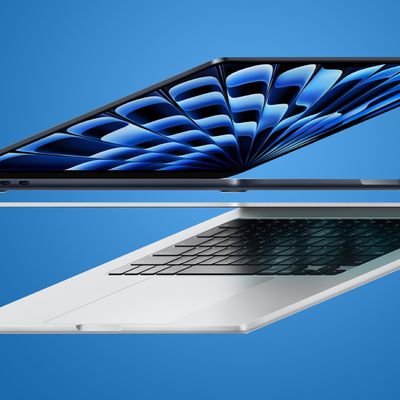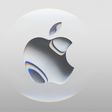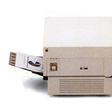Nearly All Mobile Device Makers Cheat on Benchmarks, Except Apple and Motorola
Following Tuesday's report that Samsung artificially inflates its benchmarking scores, well-respected hardware review site AnandTech has published evidence suggesting nearly all mobile manufacturers, with the exception of Apple and Motorola, use CPU/GPU optimizations to game benchmark tests.
Samsung and other OEMs use a variety of methods to enhance device performance when a benchmark is detected. For example, with its Galaxy S 4 Samsung raised its thermal limits (and max GPU frequency) to get an edge on certain benchmarks and also raised its CPU voltage/frequency to its highest state when a benchmark was sensed, a tactic engaged by multiple manufacturers like LG, HTC, and ASUS as well.
In the table below, Anandtech highlights devices that detect benchmarks and immediately respond with max CPU frequency.
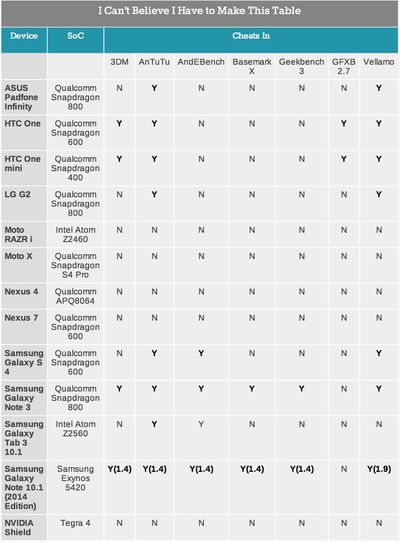
With the exception of Apple and Motorola, literally every single OEM we’ve worked with ships (or has shipped) at least one device that runs this silly CPU optimization. It’s possible that older Motorola devices might’ve done the same thing, but none of the newer devices we have on hand exhibited the behavior. It’s a systemic problem that seems to have surfaced over the last two years, and one that extends far beyond Samsung.
AnandTech notes that it’s a continual "cat and mouse" game discovering which devices have optimized for which benchmarks, because targeted benchmarks must be avoided.
The only realistic solution is to continue to evolve the suite ahead of those optimizing for it. The more attention you draw to certain benchmarks, the more likely they are to be gamed. We constantly play this game of cat and mouse on the PC side, it's just more frustrating in mobile since there aren’t many good benchmarks to begin with. […]
There's no single solution here, but rather a multi-faceted approach to make sure we’re ahead of the curve. We need to continue to rev our test suite to stay ahead of any aggressive OEM optimizations, we need to petition the OEMs to stop this madness, we need to work with the benchmark vendors to detect and disable optimizations as they happen and avoid benchmarks that are easily gamed.
Despite all of the effort that OEMs put into benchmark optimizations, the gains are negligible. The impact on CPU tests revealed a 0 to 5 percent performance increase, and a less than 10 percent increase on GPU benchmarks.
Popular Stories
While the iPhone 17 Pro and iPhone 17 Pro Max are not expected to launch until September, there are already plenty of rumors about the devices.
iPhone 17 Pro's alleged design via Front Page Tech
Below, we recap key changes rumored for the iPhone 17 Pro models as of March 2025:
Aluminum frame: iPhone 17 Pro models are rumored to have an aluminum frame, whereas the iPhone 15 Pro and iPhone...
Apple today announced refreshed 13- and 15-inch MacBook Air models, now featuring the M4 chip, an upgraded camera, and a new "Sky Blue" color option.
"Sky Blue" is an all-new blue finish that joins Midnight, Starlight, and Silver. Apple describes it as a "beautiful, metallic light blue that creates a dynamic gradient when light reflects off of its surface." Space Gray is no longer available. ...
Apple today announced the 11th-generation iPad, now featuring the A16 chip and more storage.
The announcement came alongside the debut of the new iPad Air, which now features the M3 chip. From Apple's press release:
The A16 chip provides a jump in performance for everyday tasks and experiences in iPadOS, while still providing all-day battery life. Compared to the previous generation, the...
Apple today introduced new 11-inch and 13-inch iPad Air models with the M3 chip, along with an updated Magic Keyboard for the device.
With the M3 chip, the new iPad Air should offer up to 20% faster performance compared to the previous-generation model with the M2 chip, which was released in May 2024. In addition, the M3 chip brings hardware-accelerated ray tracing to the iPad Air for the...
Apple CEO Tim Cook teased a new product announcement this week, sharing a short video that says "there's something in the Air." Based on the "Air" wording and the timing of the launch, it sounds like we're going to get new M4 MacBook Air models.
Design
Apple will continue to offer the MacBook Air in two sizes, including 13 inches and 15 inches. We are not expecting notable design updates,...
Apple CEO Tim Cook today teased a new product announcement coming "this week."
"There's something in the air," the teaser says.
This teaser likely refers to a new MacBook Air with the M4 chip, which is already expected to be announced as early as this week.
Apple used the same "there's something in the air" slogan before it announced the original MacBook Air in 2008.
Cook shared a si...
The new MacBook Air has a useful upgrade: it natively supports up to two external displays, in addition to the laptop's built-in display.
In other words, the latest MacBook Air can be used with a pair of external displays without needing to keep the laptop's lid closed.
Apple's tech specs for the new 13-inch and 15-inch MacBook Air:Simultaneously supports full native resolution on the...
iOS 19 is still around three months away from being unveiled, but there are plenty of rumors about the upcoming update.
Below, we recap iOS 19 rumors so far.
Redesigned Camera App
A leak earlier this year allegedly revealed a redesigned Camera app coming with iOS 19.
On his YouTube channel Front Page Tech in January, Jon Prosser shared a video showing what the new Camera app will...
The upcoming iOS 18.4 update for the iPhone includes two smaller but meaningful improvements for Apple's in-car iPhone mirroring system CarPlay.
First, CarPlay now shows a third row of icons, up from two rows previously. However, this change is only visible in vehicles with a larger center display. For example, a MacRumors Forums member noticed the change in a Toyota Tundra with a 14-inch...



